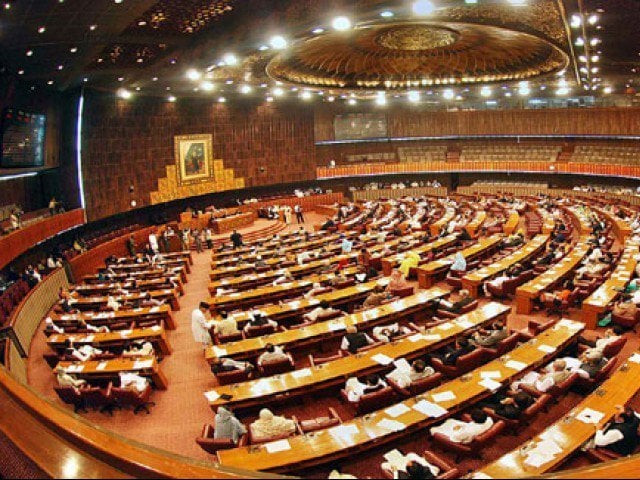18th Amendment: seeking rent?
Introduced by corrupt politics that became Pakistan's second nature

PHOTO: FILE
This S P Huntington’s recommended method of political transition was followed by South Korea, Turkey, Indonesia, Singapore, Malaysia and even Taiwan to modernise their economies under authoritarian rulers. Only when these countries had achieved a degree of economic ability and sustainability that they allowed and opened up political institutions and political systems for democratic contestations. The countries that sought political order first are in today’s world a success story. Those that didn’t lag behind and all they could do was offer democracy to the people only as the best revenge.
Deprived of a strong state with modern institutions all that politics has done in Pakistan over the years is to find whom to blame for this predicament. The political tussle between the Centre and the provinces is not today’s creation: we witnessed it in the 90s when Benazir Bhutto was the Prime Minister and Nawaz Sharif was the Chief Minister of Punjab. Two decades later nothing has changed. While the modern powerful states homogenise administration and authority over the entire territory and sovereignty everywhere in the state ours remains a different case. There was a simple political formula to address the woes of the poor people of this country. Marshal and manage the state resources efficiently and effectively to serve the people and to retain a professional army that could guard our frontiers. We have been able to achieve the latter but have miserably failed to implement the former. Why?
We became a rent-seeking society. A culture of rent-seeking was introduced by our corrupt politics that became our second nature. The phrase that ‘yaee Pakistan haiee idhaar sab chalta haiee’ — meaning this is Pakistan and everything can be managed here — was the creation of our type of politics that remained corrupt to the core. One party that had its roots entrenched in the province where it kept the people deprived of education and thriving in poverty gifted us the 18th amendment. Not because we were so politically competent that we deserved autonomy but only because the public offices there were all under their governmental control and maintaining political and administrative control there meant securing lifetime rent for themselves. Now 18th amendment not only guards such politics but also their political fortunes with Centre only acting as a wolf without fangs that can only frown on such political inability. This arrangement only ensures a patrimonial bureaucratic system where the privileged offices are dished out to friends, families and political loyalists whose political loyalty in the service of a political family endures with the Centre sitting on the sidelines unable to do anything to shift the political tide.
Where to from here if not to where and what S P Huntington suggested and we didn’t implement. Even his student Francis Fukuyama — the author of many good books on politics, including The Origins of Political Order and Political Order and Political Decay — suggests that ‘there has to be order first before there is any democracy’. What provokes political decay in our country is not the cause (18th amendment) but its effect (rent-seeking politics). Why shouldn’t there be a need to reconsider neutralising the effects of this amendment if we live in a democratic society? The authors and supporters of this amendment are actually the stakeholders, the rent-seekers that hold immoral vetoes over any such political reform. The only way to displace these stakeholders and rent-seekers is to bring the amendment up for debate in parliament and if nothing else let the people determine and differentiate between the impersonal and patrimonial elites who under the garb of politics capture the state’s political offices and in turn the state and use the state power to only enrich themselves by executing rent-seeking schemes. Only rent-seekers are likely to oppose a strong state with an impersonal bureaucratic system in which check and balances can be executed from the Centre.
In our 70-plus years history as a nation there have been political moments and there have been stories, the stories of Ayub, Bhutto, Zia, Benazir, Nawaz Sharif but what about the story of the ordinary people? That story teller of the ordinary people to the disliking of many ‘rent-seeking’ politicians has come in the shape of Imran Khan. His ability to reason through logic has introduced an era of cognitive politics in which both those that work with their heads and hands belong together in a society where the political office holders must take care of the people of their constituency not only on the papers as managed through 18th amendment but with a transparent, see-through political system that can be held accountable. History is witness that the rise to power of such an idea cannot be halted because it is based on moral and just political values.
What happens to unjust, unfair and unreasonable political institutions that are created for self-service is that they become unsustainable and fall from grace. Americans in the South passionately tried to defend the peculiar institution of slavery, even the constitution allowed them to do so. There the conflict could not be resolved under the constitution and necessitated a civil war claiming over 600,000 American lives. Yet slavery as an institution being unfair could not sustain itself.
The cause of 18th amendment is just but its effects are slavish and unfair. In an unjust political system it is giving nothing to the poor and well deserving people. Like in ‘Much Ado about Nothing’ Benedick (18th amendment) and Beatrice (people) are not in love with each other.
Politics in Pakistan is demonstrating a ‘Maginot Line Mentality’. Politicians like Maulana Fazal-ur-Rehman, Asfand Yar Wali and Mohsin Dawar have already taken fixed position on the matter of 18th amendment but like the stories I mentioned earlier these politicians will be remembered as part of a story of irrelevance, a ‘story of failure to adjust’ — when the actual story of Pakistan’s state modernisation and eventual success is written.
Published in The Express Tribune, May 3rd, 2020.
Like Opinion & Editorial on Facebook, follow @ETOpEd on Twitter to receive all updates on all our daily pieces.













COMMENTS
Comments are moderated and generally will be posted if they are on-topic and not abusive.
For more information, please see our Comments FAQ